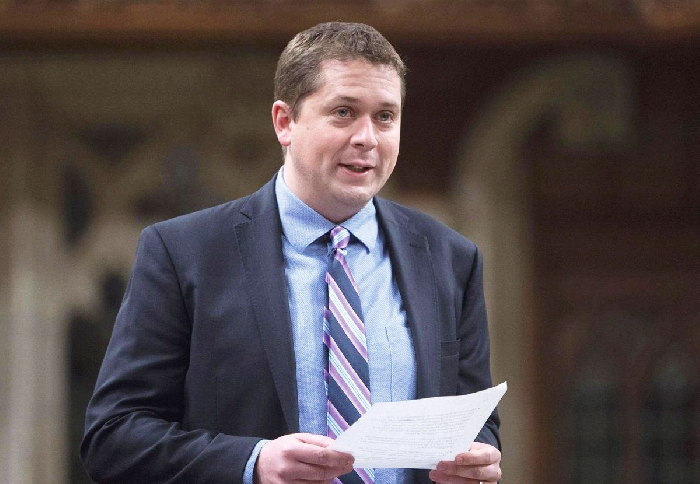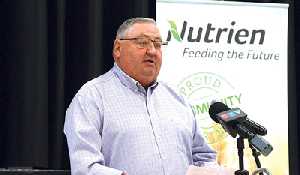Scheer promises different approach on pipelines
April 25, 2018, 12:08 pm


On Thursday, April 19, World-Spectator editor Kevin Weedmark spoke with federal Conservative leader Andrew Scheer about the problem of getting pipelines built in Canada.
Following is a complete transcript of the interview portion of the conversation:
The CEO of Kinder Morgan is now saying that the uncertainty around TransMountain is making the project untenable. How should this whole file have been handled?
We need to go back and look at where this all started.
Justin Trudeau put out this false narrative in the last election that the approval process was to blame. He started undermining the creditability of our independent, science-based approval process that saw four major pipelines built during the Conservative government.
He emboldened protestors by saying that everyone had to grant social license, and that only communities could grant permission, which really did fuel up all those groups that are perennially opposed to any type of development.
Then he killed Northern Gateway based on political considerations. They are not based on science, they’re not based on legitimate environmental concerns, they are just based on a political promise during the campaign.
He is putting in a carbon tax and threatening the energy industry with some of the most outrageous regulations in bill C69.
That is why we are where we are today. With TransMountain—the stakes are so high with TransMountain. It’s getting all the attention. It’s where all the protestors tend to converge on, because it is the only pipeline in the works right now.
He killed Northern Gateway and he killed Energy East.
So after lack of action for months, Justin Trudeau only just last week met with Premier Horgan of B.C. Conservatives have been calling on Justin Trudeau to meet with Premier Horgan to start working on an off-ramp from this confrontation. We’ve been asking for months. We had a motion from the House of Commons in February. The Liberals voted against it. So we are where we are today because of Justin Trudeau’s complete mismanagement of the energy file.
What side do you think the Prime Minister is on on this particular project?
I suspect when you look at everything that he has ever said, when you look at Gerald Butts, the man running government in Ottawa right now, they don’t believe in the energy sector, they want to phase out the oil sands.
I think Justin Trudeau is happy to let others do his dirty work and I have no doubt that he would be very happy to watch this pipeline get cancelled or delayed to the point where Kinder Morgan just has to back off themselves.
What does the federal government need to do now to ensure that the Trans Mountain project can proceed?
It is so late now that anything they do will take time.
They need to clearly stand up for federal areas of jurisdiction. This was declared to be of national interest some time ago.
They should have spelled out a legal framework about what that meant months ago. They need to reappeal Bill C69.
Bill C69 is not getting the attention it deserves but when you talk to literally everyone involved in the energy sector, whether it’s drillers and extractors to pipeline manufacturers to primary producers to heavy trades, they realize that bill C69 will make it so that there is not another major energy project ever again in this country.
They need to restore some confidence in the sector so that companies do have patience to deal with some legal challenges or with some minor delays.
Right now there is all that conflict and the federal government has to be a champion for them. That is just so incredibly important.
I know the Liberals would like us to focus on Kinder Morgan, they would like this to be the criteria of whether or not they are successful or not, but this should not be about TransMountain, this should be about Energy East, Northern Gateway, this should be about everything.
They drove out $87 billion dollars of investment into the energy sector. What Justin Trudeau is now saying is in order to get a pipeline built in Canada you need to have the federal government use taxpayer dollars to get it built, basically nationalizing parts of the energy sector. That is a terrible indictment of his own record.
I don’t know how familiar you are with Moosomin—you were here during the leadership campaign—but we have the TransCanada Pipeline just to the north of us and the Enbridge Pipeline just to the south, and Moosomin is often a field office site for pipeline construction on both lines. With the cancellation of Energy East we lost what would have been a massive tank farm at the Moosomin Compressor Station, and feeder pipelines from Cromer, Manitoba and Williston, North Dakota to the Moosomin site. TransCanada of course cancelled the project after changes in the federal approval process. Can you foresee any way in which a project like that could be resurrected under a new regulatory regime?
I would make it a priority as Prime Minister to try to get TransCanada back to the table.
There is still a market in eastern Canada for western energy.
I don’t believe that motorists in Quebec or Ontario or Atlantic Canada are happy that they are importing oil from other countries.
There are tankers full of oil coming up the St. Lawrence into eastern refineries.
They killed the project because, as you mentioned, the Trudeau Liberals changed the regulatory process to include both upstream and downstream emissions.
It’s the only sector of our economy that is now subject to that complete double standard and a standard that is not applied to oil being imported.
I believe that by removing those conditions and by repealing C69 we could show the investors and companies that you have a government that is going to be a champion of the sector, and hopefully they would come back to the table, so I do think that is possible.
Energy East was one of those grand nation building projects that would have brought our country closer together.
It had support in Atlantic Canada, support in Quebec and Ontario outside of the political realm. Many people in the economy outside of government knew that would be great for the economy, and I think that we could create the conditions for a win on that in a Conservative government and not with the Trudeau liberal government.
With the Enbridge Line 3 replacement, we just had five officials from Enbridge come out yesterday to the Moosomin Chamber of Commerce. We were told yesterday the company still isn’t totally ready to let out contracts on the Saskatchewan spreads—although they’re hoping to have more clarity within a few weeks.
That’s a project that has met all the approvals in Canada and is now facing uncertainty because of opposition in Minnesota.
Looking at all these pipeline projects, do we need a whole new approach to pipeline approvals so there is some certainty?
We need to stop having different levels of government act embarrassed about it.
Pipelines are safe, they’re environmentally friendly, they move energy with minimal greenhouse gas emissions—better than trains and trucks.
We should be proud of it.
We should be proud of the fact that we have ethically extracted environmentally sustainable energy coming out of western Canada.
It’s extracted the cleanest way in the world.
We should be creating a brand for Canada for Canadian energy. That, I think, would help allay some of the concerns that others have in other areas—protesters and opponents who never support any new development in the energy sector play off of it. I think that is critical. We need a better established legal framework to ensure that once the objective criteria are met for these projects, that every level of government respect that and allow it to proceed.
Scotiabank recently came out with a report on the impact of lack of pipeline access on the Canadian economy. Were you surprised to see the extent of the impact unveiled in that report.
No, we’ve known, we’ve been warning people about this for months now that the energy sector is a huge part of our country’s economy, and lack of capacity to transport energy means stagnation.
It means there won’t be new exploration.
Companies won’t invest in finding new sources or production if they can’t move their products.
That is true for any industry.
It impacts the agriculture sector when we can’t move our grain because of backlogs on rail.
It’s true with manufacturing when you can’t get contracts for trucking, so it’s no surprise that lack of market access and capacity of pipelines is have an effect on the overall economy.
In addition, we continue to take a massive discount on our energy because we are so dependent on one major customer, and the discount that we are taking from the U.S. market versus what we could get on the world market is a massive amount of lost potential in our economy that I’m not convinced Canadians everywhere realize how significant that is.
How important is it to reduce that differential between Western Canada Select and world prices for oil?
It is critical. I mean, to put it into personal terms, if you’re selling anything, you wouldn’t want to sell it at a discount to what you could be getting.
Farmers don’t want to sell their grain at half of what they could get.
People who manufacture anything want to get the best possible price so they can hire more people, pay better wages and put more people back to work.
It is also subsidizing the American energy consumer by providing them with cheaper energy than they could get on the world market.
It’s just not fair. It’s a lost source of revenue for provincial and federal governments to pay for things like health care and hospitals, schools and roads.
Is expanding pipeline capacity the only part of the puzzle, or are there other elements of government policy that would have to change to ensure that Canadian energy producers can get their products to market?
I mentioned C69 and I also believe the carbon tax has to go. Even the threat of the carbon tax coming in has had an impact around boardroom tables around the world.
We see companies moving investments out of Canada. They are not getting out of the energy business, but they are getting out of the energy business in Canada, and that started really once Justin Trudeau confirmed that he is going to impose a carbon tax on Canadians.
How different would a Conservative government’s approach to pipelines be?
We are going to be coming out with more specifics on exactly what the regime would look like, but it is essential that we remember that under the previous government four major pipelines were constructed and a fifth, the Northern Gateway, was approved. The Liberals killed that.
There were some things that could have been done to streamline the process, getting some of the social issues, whether it’s First Nations engagement or concerns around impacts on communities, out of the science-based aspect of the system, keeping the NEB looking more to the technical requirements and certainly the environmental impact, that type of thing.
A Conservative government would be that champion industry needs to create that Canadian brand that people around the world would want.
When you look at the work conditions in Saudi Arabia or Nigeria, when you look at the environmental standards and look at human rights concerns, we should want people in Europe, Asia, and South America clamoring for Canadian oil.
But when you have politicians like Justin Trudeau or the NDP over the course of the last decade running down our energy sector, running down the oil sands, running down Canadian companies that have a great record, it’s no surprise that we have work to do to repair that.
If I can ask you one question on a totally different subject, there has been an outpouring of support for Humboldt across the country. Here in Moosomin on Friday night, Mike Schwean and a few people organized a junior game with about 100 current and former junior players that raised $55,000 for Humboldt. What are your thoughts on seeing the response to the Humboldt Broncos tragedy across the country?
In the wake of an unimaginable tragedy, it is heart warming to see not just the province of Saskatchewan come together to support the families of the victims, but indeed the entire country.
Looking at what hockey teams in literally every province have done, or fundraisers that are going on all over the country, the outpouring of support internationally, Her Majesty the Queen, President Trump, foreign heads of state, I think the world really felt Humboldt’s pain and I think that is very meaningful not just to the victims and their families but also to everyone in Saskatchewan who really do feel that this struck all of us on a personal level.
Alright. Thank you very much for your comments and your time this morning.
Thank you! Always great to chat!



































